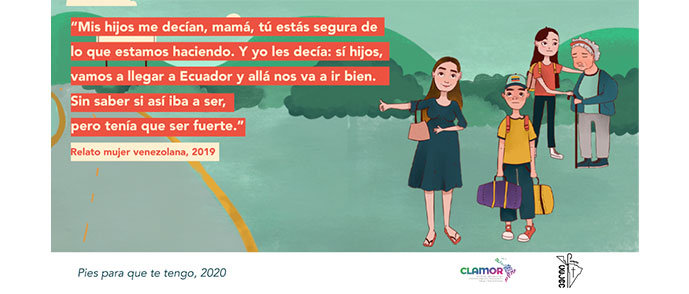“Love the stranger because you were strangers in the land of Egypt.” (Dt. 10.19)
November 13, 2020. The feet of Noelia, Edwin, John Jairo, Jesús, Miguel Ángel, Olivia, José Manuel, Jackeline, Kelly, as well as those of the more than five million Venezuelan refugees and migrants, are tired of so much walking and retracing the roads in search of protection and a dignified future in Latin America and the Caribbean.
They are strong, agile feet, but they hurt, they are already injured by kilometers of roads, by the fears, frustrations and uncertainties that have marked their steps since they left the country where they were born and grew up.
For this reason, from the CLAMOR Network we decided to look beyond numbers and statistics to tell stories of the life of Venezuelans who one day said “feet so I have you” and launched themselves on the transit routes in search of a safe destination.
Between August and December 2019, the Clamor Network carried out the investigation “Pies para que te quiero” or Feet so I Have You, it collects more than 200 testimonies from Venezuelan refugees and migrants in different countries of Latin America.
In this publication, which is full of life and concrete experiences, we share the suffering and risks that refugees and migrants have faced; but in a special way, the courage, inner strength and resilience of men and women who are fighting tirelessly, creatively, to achieve goals and make their dreams come true.
Dear sister, dear brother, I hope that the passages of these testimonies reach your heart because this book wants to move the hearts of all men and women of goodwill. There are many people who, despite the Church or religion they belong too, or even without being part of a believing group, are sensitive to human pain and are capable of reaching out to refugees and migrants. Here we are presented with the testimonies of some of the many Venezuelan refugees and migrants at the present time, but their words can move us in favor of people in this situation from any region of the world. We, believers, know that altruistic hearts are moved by the same Spirit that wants to move believers.
And if this book falls into the hands of authorities in any country where Venezuelan refugees and migrants reside, I hope the authorities find the motivation to favor suitable policies that open the arms of their nations to those who bring wealth through their culture and work, this will essentially make their countries prosper. At the same time, this builds healthy international policy, supported by the necessary dialogue between the authorities of each nation, since we all need each other, “because we are all in the same boat.” On the other hand, it is urgent that politics lean in a new direction when it comes to the economy so that we can have proper integral development and create an economy at the service of all people, not just a few.
If this book and the testimonies of these people is found in the hands of educators and of all those most involved in the promotion of culture, the hope is there is motivation found to work in favor of a system that fosters a culture of openness; a culture that promotes healthy intercultural coexistence. This ensures that in this globalized world we are able to tear down the walls that separate us and to create bridges of encounter to enrich each other.
Without a doubt, Venezuelan refugees and migrants are a positive force; this is due to their honest work, they are also professional, and also are vital in contributing to the development of host nations. Their testimonies attest to their ability to fight, their values of resilience, and the nobility of a people that, in the midst of so much suffering, does not stop smiling, singing, dancing, believing that tomorrow will be better, and working despite it.
This book must reach the hands of all people, so that we are fully convinced that Venezuelan refugees and migrants are our sisters and that millions of them are living an unstoppable exodus, such as had not been seen at any time or in place. This book should motivate even more those who are already dedicated to the service of refugees and migrants, but it should also sensitize all the baptized because this pastoral should be a synodal service of a Church that understands the dimensions of this drama. It requires the commitment of all believers in a pastoral program organized along transversal lines. Let us bear in mind that each refugee and migrant person is another incarnate Christ who awaits our fraternal hand (cf. Mt. 25, 35. 43).
We are all uncomfortable with the numbers that end up telling us little or nothing about forced displacement. Let us be close to our brother in need like the Good Samaritan of the Gospel (cf. Lk. 10: 25-37), and let us approach the hearts of the people who here offer us their testimonies to know a little more and touch the Christ who lives in them.
May the Holy Family of Nazareth, who had to flee emigrating to Egypt, bless and protect all refugee and migrant families, and all families separated by forced displacement, on their way.
Gustavo Rodríguez Vega, Archbishop of Yucatán, President of the CLAMOR Network * Message from Pope Francis of March 27, 2020.
Read the report (Available in Spanish only) https://simn-global.org/wp-content/uploads/2020/11/Pies-para-que-te-tengo-Red-Clamor-2020.pdf


